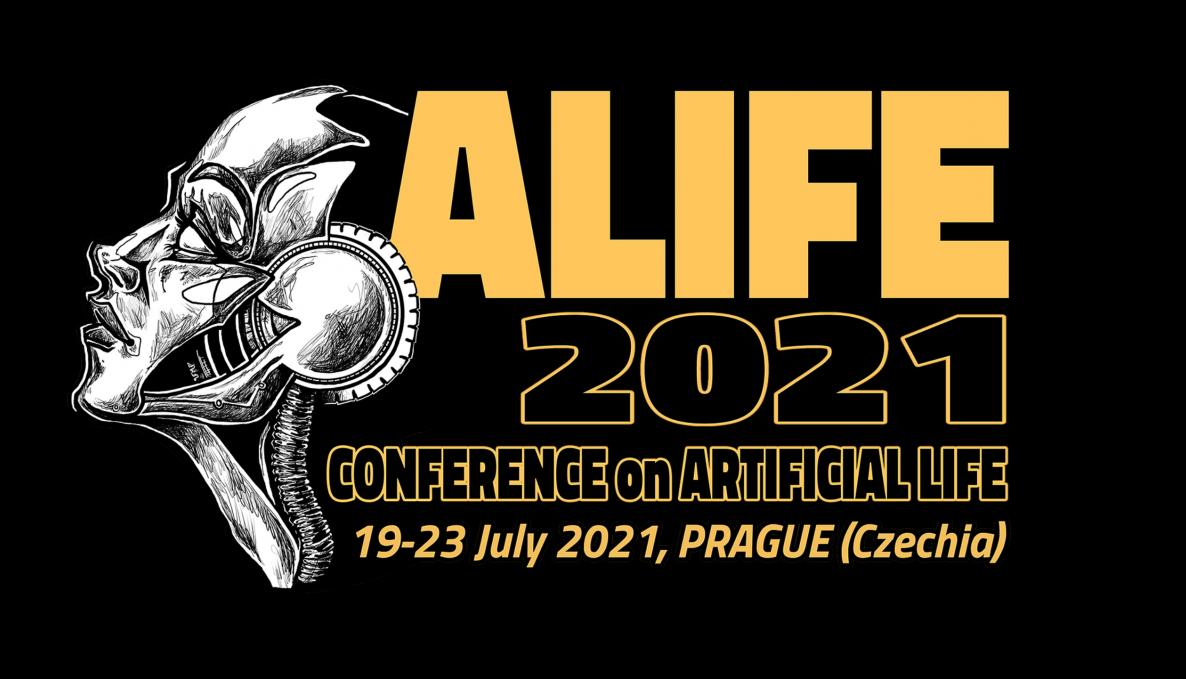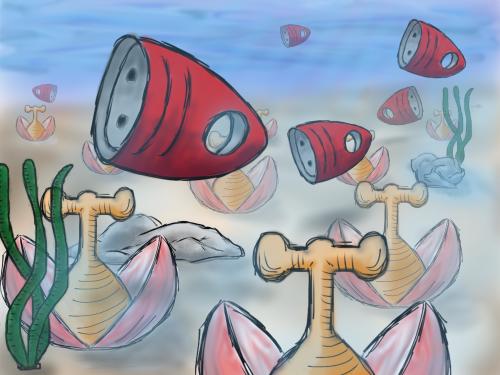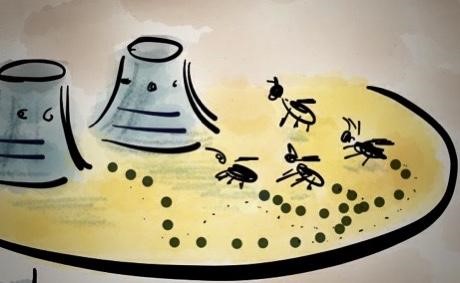COMPLEXITY ALI[F|V]E: SOCIALIZING & ECO-INTEGRATING ROBOTS WITH LIVING ORGANISMS

The Special Session + the Extension Workshop “COMPLEXITY ALI[F|V]E: SOCIALIZING & ECO-INTEGRATING ROBOTS WITH LIVING ORGANISMS” will be held in the framework of the International Conference on Artificial Life (ALIFE 2021), the major meeting of the artificial life research community. The main organizers of this Special Session + Extension Workshop (in alphabetic order) are Donato Romano, Assistant Professor of The BioRobotics Institute, Sant’Anna School of Advanced Studies, Pisa, Italy, and Thomas Schmickl, Full Professor and founder of the Artificial Life Lab, the University of Graz, Austria. Donato Romano and Thomas Schmickl are also members of the Senior Program Committee (SPC) for ALIFE 2021. Other co-organizers are Martin Grube, professor of the Institute of Biology, University of Graz, Austria, and Ronald Thenius, coordinator of the EU funded international Robocoenosis project, working in the Artificial Life Lab, University of Graz, Austria.”
SCOPE
Today, the first steps of robots taking active roles in animal societies and organismic communities are already left behind us and we may wonder where this path may lead us to. Robots, even swarms of robots, have been socialized with insects (solitary, gregarious, and eusocial species), fish, reptiles, birds, mammals, as well as they have interacted with plants. In parallel, slime molds and plants have been thoroughly investigated to develop bio-mechatronic devices, and microbial fuel cells have been designed to metabolically power robots. These parallel research tracks approach the same end goal from two directions: on the one hand, artificial entities (robots) blend into organismic societies, communities and ecosystems, while on the other hand, these robots sometimes become themselves “augmented” with increasing level of living components, such as plant skeletons, cognitive processing by slime mould based systems and bacterial guts. Ultimately, the separation of organic and inorganic components seems to weaken year by year, and emerging biohybrid compositions seem to be becoming elective in this research community. Ultimately, this novel field of science is actively working towards a specific goal: the emergence of artificial life by merging the living and the non-living into groundbreaking configurations of biohybrid systems. Integrating technical artifacts into organismic societies is an enormous challenge, as they have to blend and interact within the group just like additional nodes in the natural social and ecological interaction networks, without disturbing the emerging bio-hybrid systems.
A multidisciplinary knowledge including engineering, physics, chemistry, genetics, biology, and ecology is crucial to achieve the required robustness, scalability, predictability and bio-compatibility. Factors with a generally marginal role in robotic engineering, such as biodegradability and environmental sustainability, suddenly shift into the focus of engineering. Soft-robotics, biological material science, natural computing and regenerative robotics are buzzwords that we will hear often in this emerging field of science. Possible applications of above mentioned technologies include environmental monitoring, organistic augmentation, and other forms of “ecosystem-hacking”, which may help us to preserve as well as to restore ecosystems that are on the verge of collapsing.
GOALS & INTENDED AUDIENCE
This event, including a Special Session and a Workshop, aims at bringing together a group of world-class scientists from multiple disciplines, who created this new field in science and technology over the last years, as well as young researchers, who are interested in learning how robots and ecology cross, potentially recruiting new contributors to this thrilling emerging field. This event additionally aims at facilitating the exchange of novel ideas, methodologies and concepts. Further, we want to pinpoint critical constraints and crucial prerequisites of this research. Finally, we also want to discuss potentially dangerous aspects and ethical considerations of such systems and implementations, as well as legal factors that might become relevant due to such biohybrid systems.
TOPICS OF INTEREST
Our scope includes the below mentioned fields of research specifically but not exhaustively, all other relevant topics that are tackled by our description above are welcome.
- Animal-robot interaction
- Plant-robot interaction
- Microorganism-robot interaction
- Biohybrid systems (physically embodied or in simulation)
- Cyborg intelligence
- Ecosystem-active robotics
- Relevant ethical and law aspects
- Artistic perspectives on this topic
CONTRIBUTIONS
“COMPLEXITY ALI[F|V]E” at the ALIFE 2021 conference will include two sub-events: a Special Session and a Workshop. For the Special Session we invite contributions in form of either full papers (8 pages) or as extended abstracts (2 pages) following the guidelines of the conference (https://www.robot100.cz/call-for-papers). All papers will be reviewed within the conference review process, thus are subject to the conference’s deadline at the 7th of March 2021, and have to be submitted to the conference’s submission system. All accepted papers will be included into the conference proceedings. The format for the talks will be detailed later in the process.
The Workshop will include invited talks from estimated contributors, to create a forum to present and discuss new strategies, and future visions, within this scientific and technological field. Contributions to the Workshop should be directly sent to the organizers (email: science.beealife@uni-graz.at) that will collect and review them. These abstracts should have 500 words maximum, a clear title, a complete authors’ list and complete affiliation information in the page header. The corresponding author should be indicated.
CONFIRMED LIST OF SPEAKERS AND TENTATIVE TITLES
- Prof. Thomas Schmickl (Artificial Life Lab of the University of Graz, Austria): From BEECLUST to HIVEOPOLIS: How observing honeybees yields bio-inspired algorithms that return to the beehive in a physically embodied form.
- Prof. Cesare Stefanini (BioRobotics Institute, Scuola Superiore Sant’Anna, Pisa, Italy, & Healthcare Engineering Innovation Center, Khalifa University, Abu Dhabi, UAE): Towards animal phenotype transfer into biomimetic robots: the LAMPETRA project
- Dr. Donato Romano (the BioRobotics Institute, Scuola Superiore Sant’Anna, Pisa, Italy): Engineering animal intelligence via the hybrid interaction with biorobotic agents
- Prof. Maurizio Porfiri (Department of Mechanical and Aerospace Engineering, Department of Biomedical Engineering, New York University, Brooklyn, NY, USA): Just like Star Trek, but a little less fancy: behavioral teleporting of live zebrafish
- Prof. Jean-Louis Deneubourg (Chimie Physique et Biologie Théorique - Center for Nonlinear Phenomena and Complex Systems, ULB, Brussels, Belgium): Recipes for cooperation between competitive super organisms
- Prof. Martin Grube (Institute of Biology, University of Graz, Austria): Why the functional context-dependency of living components should not be neglected
- Prof. John Long (Department of Biology, Vassar College, Poughkeepsie, NY, USA) [Talk combined with Prof. Eric Aaron]: Hybrid Dynamical Cognitive Agent Modeling of Intelligent Behavior of Animals and Robots
- Dr. Giovanni Polverino (Centre for Evolutionary Biology, The University of Western Australia, Perth, Australia): Interactive robotic predators selectively control the behaviour of an aquatic pest and protect native species
- Dr. David Bierbach (Department of Biology and Ecology of Fishes, Leibniz-Institute of Freshwater Ecology and Inland Fisheries, Berlin, Germany): Analyzing animals' social responsiveness with biomimetic robots
- Prof. Edoardo Datteri (Laboratory of Robotics for the Cognitive and Social Sciences, Department of Human Sciences for Education, University of Milano-Bicocca, Milan, Italy): Robots as tools to study cognition: from biorobotics to interactive biorobotics
- Prof. Fédéric Boyer (IMT Atlantique, Department of Control & Industrial Engineering, Nantes, France): Title ... to be announced
- Prof. Eric Aaron (Department of Computer Science, Colby College, USA) [Talk combined with Prof. John Long]: Hybrid Dynamical Cognitive Agent Modeling of Intelligent Behavior of Animals and Robots
- Prof. Tim Landgraf (Dahlem Center of Machine Learning and Robotics, Institute for Informatics, Freie Universität Berlin, Berlin, Germany): Machine learning and real-time adaptation in animal-robot interactions
- Dr. Ronald Thenius (Artificial Life Lab, University of Graz, Austria): Biohybrid mobile agents in long term environmental monitoring
- Prof. Jason R. Parry (Purdue University, USA): Philosophy in the Age of Biohybrid Intelligence
- Prof. Heiko Hamann (Institute of Computer Engineering, University of Lübeck, Germany): A Concept of Phyto-Sensor Networks for Urban in-situ Monitoring of Air Pollution
- Dr. Mostafa Wahby (Institute of Computer Engineering, University of Lübeck, Germany): A concept of full plant morphology modeling for robot-plant bio-hybrids
- Dr. Barbara Mazzolai (Istituto Italiano di Tecnologia, Centre for Micro-BioRobotics, Pontedera, Pisa, Italy): Towards new generations of bioinspired soft robots
- Dr. Laura Margheri (Istituto Italiano di Tecnologia, Centre for Micro-BioRobotics, Pontedera, Pisa, Italy): Robotics and Nature: a bioengineer perspective
- Dr. Wen-Chi Yang (Computer Vision Lab, NeuHelium Co., Ltd., Shanghai, China): A spatially adaptive system to perceive the locomotion semantics of animal herds
- Dr. Alexander Brown (Lafayette College, Easton, PA): Investigating the influence of probabilistic robot motion parameters on archerfish behavior in fish-robot interactions
- Dajana Lasic (Department of Biology, University of Graz, Austria): A consolidated mathematical model of collective honeybee foraging regulation for bio-hybrid futuristic beehives
- Prof. Gerhard von der Emde (Institute of Zoology Neuroethology - Sensory Ecology, University of Bonn, Germany): Robots communicating with fish: Integration requires reciprocal interaction
Short CVs of organizers
Prof. Thomas Schmickl:
Thomas Schmickl is full professor at the Institute of Biology at the University (Department of Zoology), Graz, Austria, where he supervises also the Artificial Life Lab, which he founded in 2007, after returning from a HHMI visiting professorship in the USA. In 2012, he was appointed the Basler Chair of Excellence at the East Tennessee State University (ETSU), USA. His research focuses on biology, ecological modeling, bio-inspired engineering including swarm-, modular-, hormone-, and evolutionary-robotics. He also teaches ecological modeling and multi-agent simulations of biological and ecological systems. He was/is partner in the international EU-funded projects I-Swarm, Symbrion, Replicator, FloraRobotica, RoboRoyale and leading scientist and consortium coordinator of the EU grants CoCoRo, ASSISIbf, subCULTron, Atempgrad and Hiveopolis. These international grants all aim at improving the current state-of-the-art in robotics to let them be more similar to animals or plants in order to be adaptive, resilient and flexible. Recently, living organisms became parts of his targeted bio-hybrid robotic systems, in order to form a sustainable technological symbiosis. Recently, he founded the Field of Excellence COLIBRI (Complexity of Life in Basic Research & Innovation) at the Univ. of Graz, which is a network of 20+ full professors who research complexity sciences with a focus on living systems, joining forces across various disciplines.
Dr. Donato Romano:
Donato Romano received the M.Sc. degrees in Agriculture Science and Technologies (summa cum laude) from the University of Pisa, Italy, in 2014. He received the PhD in BioRobotics (summa cum laude) at The BioRobotics Institute, Scuola Superiore Sant’Anna, Pisa, Italy, in 2018. He is currently Assistant Professor at The BioRobotics Institute. He is mainly focusing his activities on bio-robotics and biosystems engineering, and in particular on animal-robot interactions, biohybrid intelligent systems, ethorobotics, neuroethology, EvoDevo. Romano’s research contributions represent a sophisticated and pioneer approach to the study of behaviour and cognition in animals, with potential applications in agriculture, environmental monitoring and management, biomedical contexts, and biohybrid multiagent systems. He is co-founder and R&D Director of the HUBILIFE srl (innovative start-up and spin-off of Scuola Superiore Sant’Anna). He worked as visiting researcher at Khalifa University, Abu Dhabi (UAE), carrying out research activities on Terahertz (THz) frequency band interacting with radiation and biological molecules and tissues. Romano is Member of the Editorial Board for Data in Brief, Elsevier, (since 2018), Frontiers in Bioengineering and Biotechnology (since 2019), Frontiers in Robotics and AI (since 2020), and Academic Editor of Applied Bionics and Biomechanics, Hindawi (since 2020).
Dr. Ronald Thenius:
Ronald Thenius is currently coordinator of the EU funded international Robocoenosis project. Since 2004 he has worked in the Artificial Life Lab of the University of Graz. After his Ph.D. in Biology he has been participating in several EU-funded research projects (I-Swarm, Symbrion, Replicator, CoCoRo, Hiveopolis and subCULTron). His main fields of research are biohybrid technology, bioinspired robotics, swarm robotics, biomimicry in robot control, with a special focus on slime mould amoebae interaction, honeybee social interaction and vertebrate neuronal systems as archetypes. His main research goal in recent years is the development of a general approach to generate biohybrid entities for environmental monitoring purposes.
Prof. Martin Grube:
Martin Grube is full professor at the Institute of Biology, specifically at the Department of Plant Sciences of the University of Graz. Over the course of a series of nationally and internationally funded research grants, he has developed an international expertise in lichen research, an important ecological topic. He also studies the complexity and evolution of microbial symbioses, incl. lichens and microbiomes associated with higher plants. He has established a research line on biological networks of fungal-like organisms, such as slime molds, to explore biological information processing. As a partner in the PhyChip project (FP7), he is dedicated to study slime mould as a model of a nature-based computer and as a source of inspiration for bio-inspired algorithms. He is one of the leading members in the steering board of the Field of Excellence COLIBRI, a complexity science initiative, at the University of Graz.



The organization and conduction of this Special Session is supported by the Field of Excellence COLIBRI (Complexity of Life in Basic Research and Innovation) of the University of Graz, Austria, The BioRobotics Institute of Scuola Superiore Sant’Anna, Pisa, Italy, as well as by the FET EU H2020 grants Hiveopolis, Robocoenosis, and RoboRoyale.



